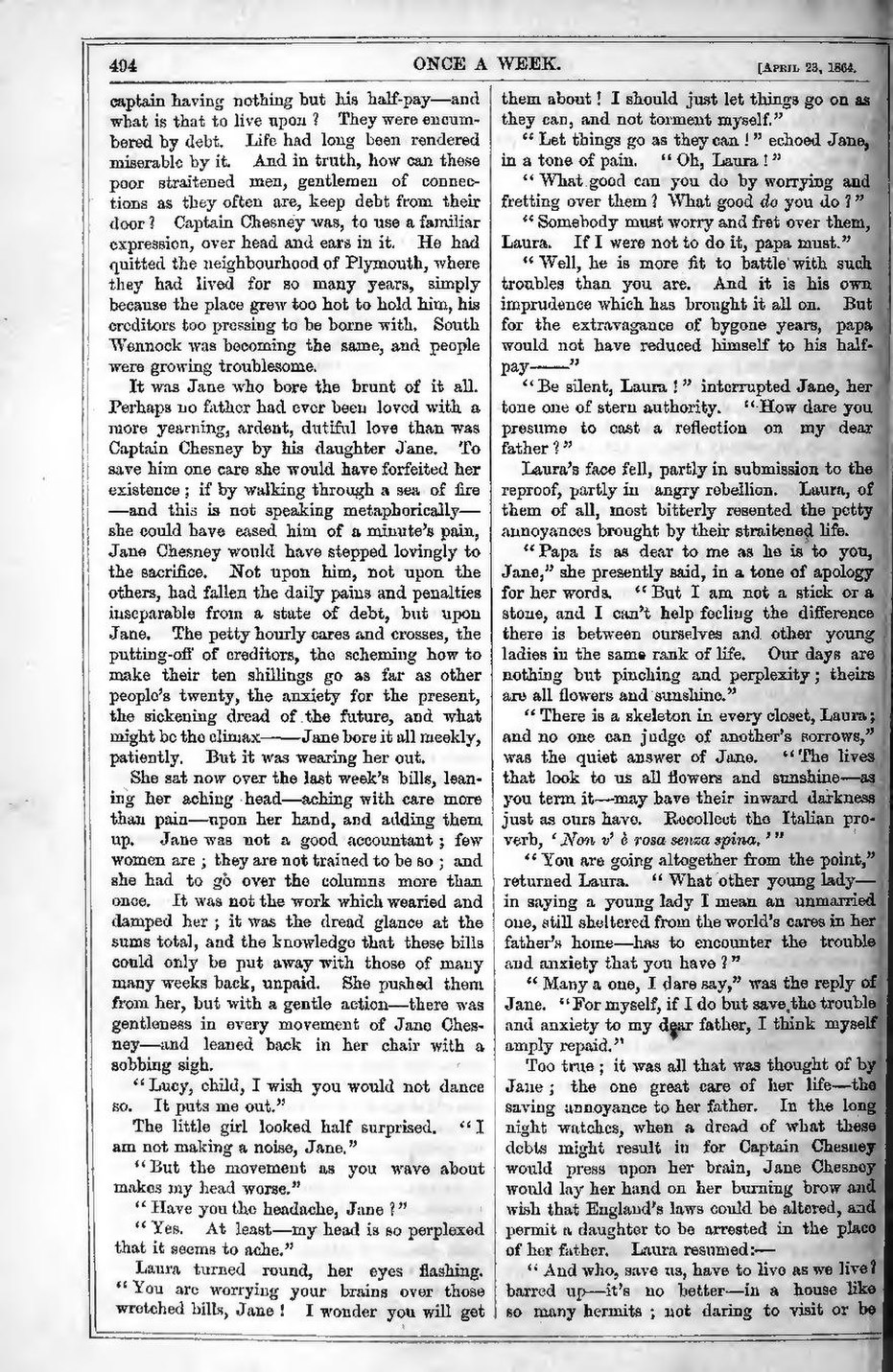captain having nothing but his half-pay—and what is that to live upon? They were encumbered by debt. Life had long been rendered miserable by it. And in truth, how can these poor straitened men, gentlemen of connections as they often are, keep debt from their door? Captain Chesney was, to use a familiar expression, over head and ears in it. He had quitted the neighbourhood of Plymouth, where they had lived for so many years, simply because the place grew too hot to hold him, his creditors too pressing to be borne with, South Wennock was becoming the same, and people were growing troublesome.
It was Jane who bore the brunt of it all. Perhaps no father had ever been loved with a more yearning, ardent, dutiful love than was Captain Chesney by his daughter Jane. To save him one care she would have forfeited her existence; if by walking through a sea of fire—and this is not speaking metaphorically—she could have eased him of a minute’s pain, Jane Chesney would have stepped lovingly to the sacrifice. Not upon him, not upon the others, had fallen the daily pains and penalties inseparable from a state of debt, but upon Jane. The petty hourly cares and crosses, the putting-off of creditors, the scheming how to make their ten shillings go as far as other people’s twenty, the anxiety for the present, the sickening dread of the future, and what might be the climax———Jane bore it all meekly, patiently. But it was wearing her out.
She sat now over the last week’s bills, leaning her aching head—aching with care more than pain—upon her hand, and adding them up. Jane was not a good accountant; few women are; they are not trained to be so; and she had to go over the columns more than once. It was not the work which wearied and damped her; it was the dread glance at the sums total, and the knowledge that these bills could only be put away with those of many many weeks back, unpaid. She pushed them from her, but with a gentle action-there was gentleness in every movement of Jane Chesney—and leaned back in her chair with a sobbing sigh.
“Lucy, child, I wish you would not dance so. It puts me out.”
The little girl looked half surprised. “I am not making a noise, Jane.”
“But the movement as you wave about makes my head worse.”
“Have you the headache, Jane?”
“Yes. At least—my head is so perplexed that it seems to ache.”
Laura turned round, her eyes flashing.
“You are worrying your brains over those wretched bills, Jane! I wonder you will get them about! I should just let things go on as they can, and not torment myself.”
“Let things go as they can!” echoed Jane, in a tone of pain. “Oh, Laura!”
“What good can you do by worrying and fretting over them? What good do you do?”
“Somebody must worry and fret over them, Laura. If I were not to do it, papa must.”
“Well, he is more fit to battle with such troubles than you are. And it is his own imprudence which has brought it all on. But for the extravagance of bygone years, papa would not have reduced himself to his half-pay———"
“Be silent, Laura!” interrupted Jane, her tone one of stern authority. “How dare you presume to cast a reflection on my dear father?”
Laura’s face fell, partly in submission to the reproof, partly in angry rebellion. Laura, of them of all, most bitterly resented the petty annoyances brought by their straitened life.
“Papa is as dear to me as he is to you, Jane,” she presently said, in a tone of apology for her words. But I am not a stick or a stone, and I can’t help feeling the difference there is between ourselves and other young ladies in the same rank of life. Our days are nothing but pinching and perplexity; theirs are all flowers and sunshine.”
“There is a skeleton in every closet, Laura; and no one can judge of another’s sorrows,” was the quiet answer of Jane. “The lives that look to us all flowers and sunshine—as you term it—may have their inward darkness just as ours have. Recollect the Italian proverb, ‘Non v’ è rosa senza spina.’”
“You are going altogether from the point,” returned Laura. “What other young lady—in saying a young lady I mean an unmarried one, still sheltered from the world’s cares in her father’s home—has to encounter the trouble and anxiety that you have?”
“Many a one, I dare say,” was the reply of Jane. “For myself, if I do but save the trouble and anxiety to my dear father, I think myself amply repaid.”
Too true; it was all that was thought of by Jane; the one great care of her life—the saving annoyance to her father. In the long night watches, when a dread of what these debts might result in for Captain Chesney would press upon her brain, Jane Chesney would lay her hand on her burning brow and wish that England’s laws could be altered, and permit a daughter to be arrested in the place of her father. Laura resumed:—
“And who, save us, have to live as we live? barred up-it’s no better-in a house like so many hermits; not daring to visit or be